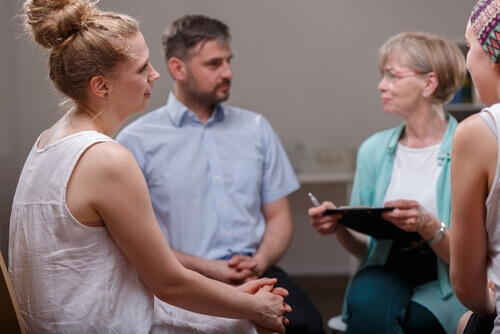Addiction Treatment Without 12 Steps
Structured peer support is a common element of many existing approaches to addiction treatment. In scientific literature, it is defined as nonprofessional, nonclinical assistance from people with similar conditions or circumstances with the aim of achieving sustainable recovery from substance abuse issues.1
This approach to addiction treatment is often also referred to as the social-community model of recovery or self-help support group.1, 2 These programs were first developed in the 1940s in the US and over time evolved into a range of peer support addiction treatment services offered by non-profit organizations.
One of the most well-known twelve-step programs is the one developed by Alcoholics Anonymous (AA). AA programs were developed roughly 80 years ago and are still widely used today. However, the emphasis these programs put on religion and spirituality, the acknowledgment of powerlessness, and surrender to a higher power are as a philosophy not equally acceptable to all treatment seekers. While for some people religion may be helpful in recovery, there are also those who are atheist or agnostic and are less likely to join a 12-step program and stay in treatment for a long time due to differing beliefs.3
Nevertheless, treatment seekers who are less religious seem to benefit from support groups as much as those who are more religious.2 This is why it is important to provide them with access to support groups for addiction treatment without 12 steps, which are secular and therefore more compatible with their worldview.

What Are Available Options for Addiction Treatment Without 12 Steps?
There are several organizations that offer peer support to individuals fighting addiction. They have their own methodology and principles for addiction treatment without 12 Steps.
SMART Recovery
SMART stands for Self Management and Recovery Training. It is a nonprofit organization that offers self-help group support to individuals with addiction issues through in-person meetings, online meetings, and other online resources, without relying on the 12 steps written by AA.
The key difference between AA and SMART Recovery is that the latter does not rely on spirituality but science. Moreover, SMART Recovery promotes self-reliance rather than powerlessness.
SMART Recovery’s approach revolves around their 4-Point Program:
- Building and maintaining the motivation to change.
- Coping with urges to use.
- Managing thoughts, feelings, and behaviors in an effective way without addictive behaviors.
- Living a balanced, positive, and healthy life.
Membership and participation are free of charge. Donations are encouraged but not requested. SMART Recovery also has open calls for volunteers and provides services for professional treatment providers.
Women for Sobriety
Women for Sobriety (WFS) is a nonprofit organization that offers support to women struggling with alcohol or drug addiction. It was founded in 1975 by Dr. Jean Kirkpatrick, who focused on the special needs of women in treatment and developed methodology different from the one offered by AA.
The pillars of the Women for Sobriety New Life Program are:
- Positive thinking.
- Approval and encouragement.
- Dynamic group involvement.
- Working on physical well-being through physical exercise, healthy diet, meditation, and relaxation.
Self-empowerment and a shift in thinking patterns are promoted through 13 Acceptance Statements that are practiced daily. As a result, women go through six levels of recovery and replace destructive behavioral patterns with a healthy and fulfilling lifestyle.
WFS supports the establishment and oversight of self-help groups, administers online resources, develops literature, and educates the public about the treatment needs of women. It has an open call for new members and volunteers and provides resources for treatment professionals.
SOS
Secular Organizations for Sobriety (SOS) is a network of autonomous non-professional support groups that help persons who undergo addiction treatment without 12 Steps or religious components. It is a nonprofit organization founded in 1985 by James Cristopher.
These groups provide help for those struggling with drug, alcohol, and compulsive eating in the form of face-to-face or online meetings. Participation is free and anonymous. SOS has open calls for individuals who want to join groups, start groups, and donors who would like to financially support the cost of running meetings and issuing publications.
LifeRing Secular Recovery
LifeRing is a volunteer organization that offers support to individuals in maintaining abstinence from substance use. Its fundamental principles are “3-S”:
- Sobriety
- Secularity
- Self-Help.
Rather than connecting with the higher power, LifeRing promotes connecting to the Sober Self and the Sober Self of other members, while weakening the Addict Self. Focus in meetings is placed on the present moment, advice, understanding, and encouragement, rather than past traumas.
LifeRing meetings are held in about 20 states and four countries which are run by trained meeting convenors. The work is funded through donations, meeting contributions, and sale of publications. LifeRing has an open call for volunteers and individuals who would like to start new meetings.
Moderation Management
In contrast to other organizations offering support to addiction treatment without 12 Steps, Moderation Management (MM) focuses only on alcohol issues. It is an organization for non-dependent problem drinkers that helps them maintain moderate alcohol use.
Relying on the premise that most individuals who quit drinking alcohol first unsuccessfully attempted to reduce their drinking, MM helps people establish whether moderation is a sustainable solution for them.
Their step-by-step approach involves self-assessment that establishes whether moderation is an achievable goal. If so, people go through a 30-day period of abstinence during which they develop personal skills and guidelines that should prevent excessive drinking in the future. After this period of abstinence, the person can start drinking again moderately by applying the newly acquired skills.
MM activities are realized through in-person meetings, video and phone meetings, chats, and online support communities such as forums and groups. Participation is free of charge; the organization is run by volunteers and is financed by donations.